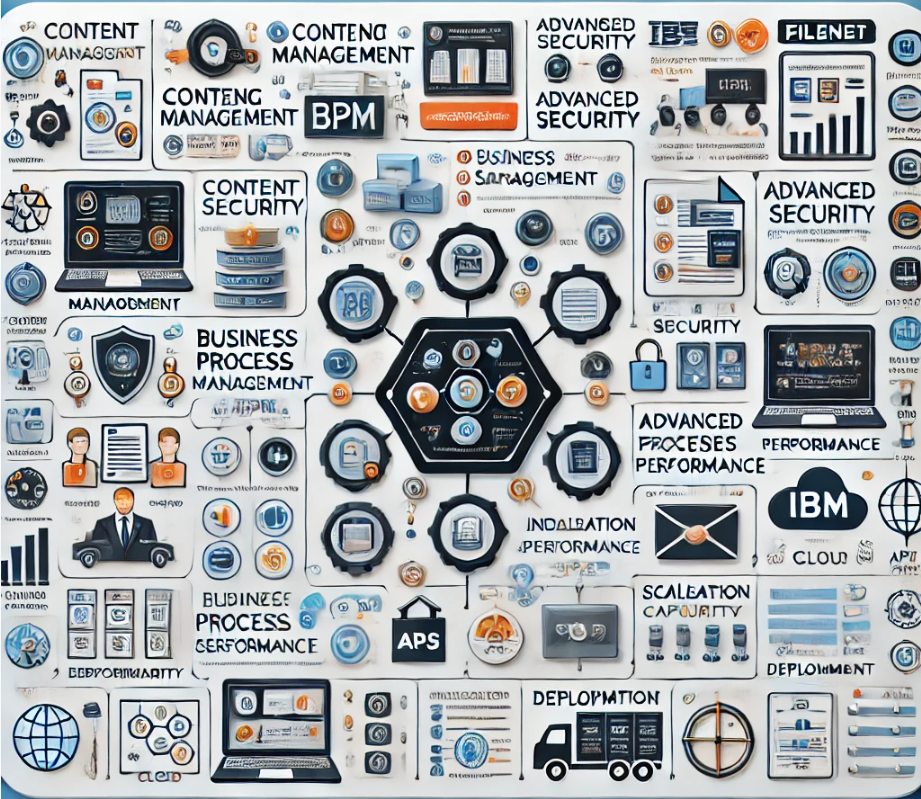IBM FileNet is an enterprise content management (ECM) solution designed to manage large volumes of content and automate business processes. It is particularly well-suited for organizations that need to handle complex workflows, ensure regulatory compliance, and securely store and manage content.
Key Features of IBM FileNet
- Content Management:
- Document Management: Store, organize, and manage documents with robust version control and metadata capabilities.
- Records Management: Ensure compliance with regulatory requirements by managing records throughout their lifecycle.
- Content Capture: Capture content from various sources, including scanned documents, emails, and electronic files.
- Business Process Management (BPM):
- Workflow Automation: Design, deploy, and manage workflows to automate business processes and improve efficiency.
- Case Management: Manage complex cases by organizing related content, tasks, and processes into a unified view.
- Integration with RPA: Integrate with robotic process automation (RPA) tools to automate repetitive tasks.
- Advanced Security:
- Access Controls: Implement granular access controls to ensure that only authorized users can access sensitive content.
- Encryption: Protect data with encryption both at rest and in transit.
- Audit Trails: Maintain detailed audit logs to track user activities and ensure compliance.
- Scalability and Performance:
- High Scalability: Handle large volumes of content and high transaction rates, making it suitable for large enterprises.
- High Availability: Ensure continuous availability and reliability with features like clustering and failover support.
- Integration Capabilities:
- API Integration: Integrate with other enterprise systems and applications using REST and SOAP APIs.
- Content Federation: Access and manage content stored in other repositories, providing a unified view across the organization.
- Cloud and Hybrid Deployment:
- Flexible Deployment: Deploy FileNet on-premises, in the cloud, or in a hybrid environment to meet organizational needs.
- IBM Cloud Pak for Automation: Leverage IBM Cloud Pak for Automation to deploy FileNet as part of a broader automation strategy.
Use Cases for IBM FileNet
- Financial Services:
- Manage documents and records to ensure compliance with regulatory requirements.
- Automate loan processing and customer onboarding workflows.
- Healthcare:
- Store and manage patient records, ensuring secure access and compliance with HIPAA regulations.
- Automate claims processing and administrative workflows.
- Government:
- Manage large volumes of records and documents to ensure transparency and compliance.
- Streamline case management and citizen services workflows.
- Manufacturing:
- Store and manage engineering documents and product specifications.
- Automate supply chain and procurement workflows.
Benefits of IBM FileNet
- Enhanced Productivity: Automate manual processes, reducing the time and effort required to complete tasks.
- Improved Compliance: Ensure compliance with industry regulations through robust records management and audit trails.
- Increased Efficiency: Streamline business processes with advanced workflow and case management capabilities.
- Scalability: Scale to meet the needs of large enterprises with high volumes of content and transactions.
- Flexibility: Deploy on-premises, in the cloud, or in a hybrid environment to suit organizational needs.
Summary
IBM FileNet is a powerful and versatile ECM solution that helps organizations manage content, automate business processes, and ensure regulatory compliance. With its robust content management capabilities, advanced security features, and scalability, FileNet is ideal for large enterprises across various industries, including financial services, healthcare, government, and manufacturing. By integrating with other enterprise systems and leveraging cloud deployment options, FileNet provides a flexible and comprehensive solution for managing enterprise content and processes.

